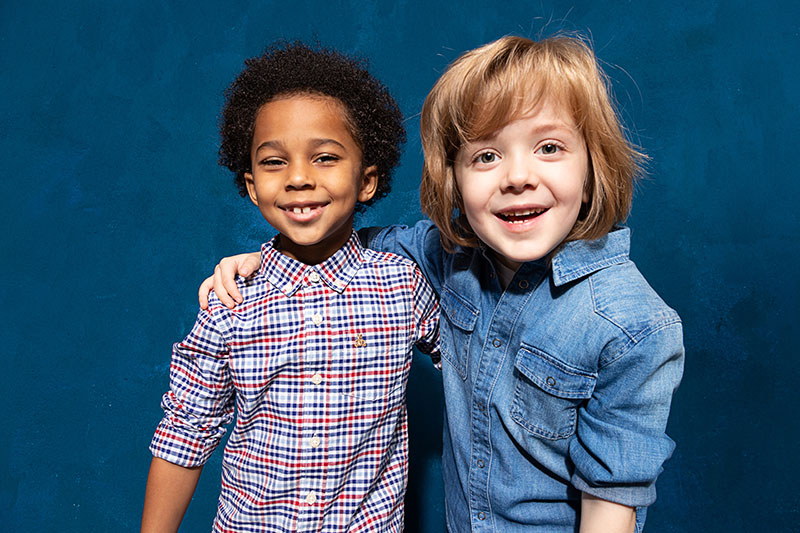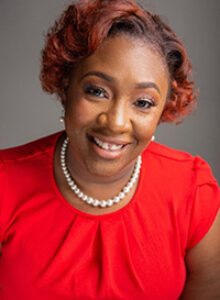Friendships play an important role in the lives of children and teenagers. These relationships help with childhood social and emotional development in many ways, including: managing emotions, responding to the feelings of others, listening, problem solving, navigating conflicts, sharing and turn-taking, and developing communication skills.6 The importance of friendship increases even more after the transition to adolescence, with adolescents beginning to spend more time with their peers and less time with their families. Not only do friendships promote social and emotional skills, but they also bring a sense of pleasure and comfort. When children are able to develop and maintain friendships, this contributes to increased self-esteem, self-confidence, and social competence, which are pivotal in child development and an overall sense of belonging within a peer group.

Making friends and being a part of a friend group affects overall mental health, school performance, general behaviors, and self-perception. As humans, we have a fundamental need for social connection,1 so when those social needs are not met, it can contribute to increased stress in many ways, including anxiety and depressed mood, stemming from rejection, exclusion, and isolation. This sense of feeling like an outcast can affect a child’s overall quality of life, leading to parents and teachers observing noticeable changes that are concerning. It is at that point when help may be sought from a mental health professional to determine the need for therapeutic intervention in some form.
An important part of being able to develop and maintain friendships is having the necessary social tools and skills needed to cultivate those friendships. However, many autistic children and teenagers have social differences that make it harder for them. Therefore, they benefit from support from important adults in their lives, including parents, caregivers, and teachers, to develop various social skills. These include: starting and having conversations, joining in group activities with peers, understanding facial expressions and body language, adjusting to new social environments, addressing differences in opinion, finding and connecting with people with similar interests, being flexible during joint activities, and being able to understand what others may be thinking or feeling.3 Autistic children and teenagers can be successful with making and keeping friends and finding peer acceptance similar to those of their neurotypical peers, but they must be provided with the opportunities to do so. As such, there are strategies that parents, caregivers, and teachers can use to further support the development of these friendships.2,3,4,7
Tips for Parents and Caregivers
- Introduce your child to social stories and use them as often as possible.
Many children with autism benefit from visual guides, particularly when learning something new. Social stories are a good way to teach a child how to respond appropriately in a specific situation. Writing scripts and drawing out the flow of a conversation can help your child understand the basics of how to talk to a friend.
Suggested resource: The New Social Story Book: Over 150 Social Stories that Teach Everyday Social Skills to Children and Adults with Autism and their Peers.
- Create opportunities for your child to meet peers, such as scheduling playdates.
Help your child get together with other children who share his or her interests and strengths. This could be through a playgroup, a special interest club at school, or an after-school class. If your child goes to school, you could ask your child if there is someone in their class who they would like to be friends with. You could talk to your child’s teacher to determine if there are children showing interest in your child, or which children have similar interests. It will likely take more effort on your part as the parent for the playdates to succeed, but the time and investment will be worthwhile for your child’s social development.
- Focus on the quality of your child’s friendships.
Even if your child has one friend, this is a huge deal. Encourage that relationship in any way you can because that one friendship will likely be the foundation for your child to develop future friendships. It is not about the number of friends your child has, but it is more about the depth of the connection they have with their small peer group. So, do your best not to compare your social experiences or another child’s social experiences to what you have observed with your child.
- Educate your child on the meaning of friendships.
This may seem like common sense, but it is important that your child understands the role of a friend, the purpose of a friendship, and the role they play in a friendship. It will be much more difficult to make friends if your child does not know what it means to be a friend. These conversations can involve asking their perceptions of a friendship, how they know someone is their friend, and what traits they have that make a good friend. These conversations should include language understood by your child that is brief, clear, and concrete. Stay away from abstract concepts and use plain language.
Tips for Teachers
- Educate yourself.
This means researching and learning what characteristics contribute to social acceptance and making friends. Trainings, consultation with qualified mental health professionals, reading books and other materials, and collaborating with other teachers are ways educators can learn and expand their knowledge base of Autism Spectrum Disorder and social skills.
- Set up lunchtime social groups.
These friendship groups can give children the opportunity to have fun and connect with peers in a smaller setting, but within the school environment. They can be taught specific skills to determine common interests and engage in meaningful conversations and being involved can create a sense of social acceptance and belonging to a peer group. Teachers and/or school counselors can coordinate these groups within the school setting with a specific goal of promoting various social skills that can be generalized to different social environments.
- Encourage group activities.
Make every effort to involve students in play groups and shared learning activities. Pairing students with one other person or putting them in small groups of three within the classroom can also promote social connection.
- Create a positive buddy system.
When children with autism are paired with a confident classmate, they will learn to make friends, play well together, and adhere to social rules in an unstructured setting. These pairings can help in encouraging prosocial behaviors and can occur while walking down the hall, during recess, and when there is other unstructured time.
Most importantly, parents, caregivers, and teachers should have fun when supporting their children and students in social settings. If making friends feels like work, children will likely avoid the interaction. Support your child and students and make the process as fun and playful as possible because making friends is not always easy and can be especially overwhelming for autistic children and adolescents.
Dr. April L. Coleman, PsyD, is a Georgia licensed psychologist and the clinical training site coordinator at the Georgia Autism Center in Peachtree Corners, Georgia. She has been working in the mental health field for 15 years and has been in private practice for the past 8 years. Dr. Coleman specializes in the comprehensive assessment of Autism Spectrum Disorder (ASD), specific learning differences, and Attention-Deficit/Hyperactivity Disorder (ADHD). She works with individuals aged 12 months through young adulthood. Dr. Coleman also speaks at various parent events and workshops in which she educates parents and caregivers about the common signs of ADHD, ASD, and specific learning differences; when it is time to seek support from a qualified professional for an assessment; and what next steps should be once the assessment process is complete and diagnoses are shared.
Dr. Coleman enjoys working with families from diverse backgrounds and circumstances. She has worked in a variety of settings including schools, community mental health clinics, community service boards, child advocacy centers, specialized treatment centers, social service agencies, and private practice. She has also collaborated with institutions to conduct assessments within residential treatment facilities, within juvenile detention centers, within foster homes and group homes, and for the Georgia Division of Family and Children Services. With her years of experience, Dr. Coleman’s clinical work extends beyond the assessment process and also involves providing support, guidance, and consultation to parents and caregivers post-diagnosis to ensure that the families’ needs are met as best as possible.
Dr. Coleman is a former clinical psychology graduate level professor of five years in which she taught child and adolescent psychopathology and life span development, and she led a diagnostic assessment seminar for students within the child and family curriculum. She also is the current practicum site supervisor for graduate level students at Mercer University and the University of Georgia. Dr. Coleman is a graduate of Georgia State University and The Georgia School of Professional Psychology. She holds a Bachelor of Science degree in Psychology and a Master of Arts and Doctor of Psychology in Clinical Psychology. Dr. Coleman resides in Metro Atlanta with her husband and their 16-month-old daughter.
More information about Dr. Coleman and how to connect with her can be found at https://linktr.ee/psychdrapril and www.georgiaautismcenter.com.
References
Black, M.H., Kuzminski, R., Wang, J. Ang, J., Lee, C., Hafdzuddin, S., & McGarry, S. (2022). Experiences of Friendships for Individuals on the Autism Spectrum: A Scoping Review. Review Journal of Autism and Developmental Disorders (2022). https://doi.org/10.1007/s40489-022-00332-8
Boutot, E. (2007). Fitting In: Tips for Promoting Acceptance and Friendships for Students With Autism Spectrum Disorders in Inclusive Classrooms. Intervention in School and Clinic – Intervention School Clinic. 42. 156-161. 10.1177/10534512070420030401.
Friends and peers: Autistic children and teenagers. Raising Children Network. (2021, May 19). Retrieved August 31, 2022, from https://raisingchildren.net.au/autism/communicating-relationships/connecting/friends-peers-asd
Helping kids with autism make friends. Marcus Autism Center. (n.d.). Retrieved August 26, 2022, from https://www.marcus.org/autism-resources/autism-tips-and-resources/helping-kids-with-autism-make-friends
Helping the Autistic Child Build Peer Relationships and Friendships http://www.handyhandouts.com/pdf/195_HelpingClassroomPeers.pdf
Lorina. (2020, July 25). Supporting children developing friendships. Aussie Childcare Network. Retrieved August 28, 2022, from https://aussiechildcarenetwork.com.au/articles/teaching-children/supporting-children-developing-friendships
Meyers, M. K. (2016, January 31). How parents can help their child with autism make friends. WeHaveKids. Retrieved August 26, 2022, from https://wehavekids.com/parenting/How-to-Help-Your-Child-With-Autism-Develop-Meaningful-Friendships





